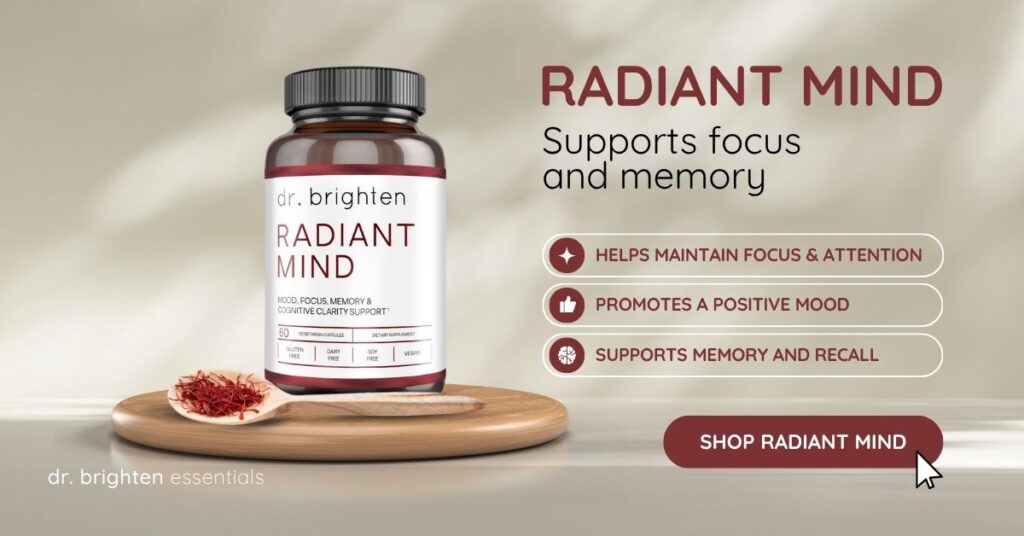Perimenopause and menopause aren’t just about hot flashes and irregular periods. For many women, the most frustrating symptom isn’t even physical; it’s mental.
Words escape you mid-sentence, concentration slips away, and your once-sharp memory feels sluggish. These are all examples of what perimenopause brain fog feels like. They're among the most common (yet least discussed) cognitive changes to occur1 during this hormonal transition.
If you’ve noticed more mental fatigue, forgetfulness, trouble focusing, or general “fuzziness,” there's a good chance hormonal shifts are affecting how your brain works. Fortunately, there are clinically backed ways to deal with perimenopause brain fog and support mental clarity, including nutrition, supplements, and lifestyle upgrades.
In this article:
- What You’ll Learn in This Article
- How Does Menopause Affect the Brain? (Hormones, Memory & Focus)
- Brain Fog in Perimenopause Timeline
- Quick Relief for Menopause Brain Fog
- Perimenopause Memory Loss vs. Dementia: What’s the Difference?
- Menopause Brain Fog vs. Dementia
- Best Supplements for Menopause Brain Fog
- Supplements & HRT for Menopause Brain Fog
- Can Hormone Replacement Therapy (HRT) Help Menopause Brain Fog?
- Lifestyle Changes That Help Reduce Perimenopause Brain Fog
- FAQ: Brain Fog in Perimenopause and Menopause
- What to Try First: A Simple 6-Step Plan
- When to See a Doctor
- Final Thoughts: Overcoming Brain Fog in Menopause Naturally
What You’ll Learn in This Article
- Why brain fog happens in perimenopause — the role of estrogen, progesterone, and brain chemistry.
- How menopause affects memory, focus, and mental clarity.
- The difference between menopause brain fog and dementia (and when to see a doctor).
- Natural ways to support clearer thinking — including sleep, nutrition, and daily habits.
- Supplements studied for brain fog support — saffron, bacopa, citicoline, omega-3s, and magnesium.
- What research says about hormone replacement therapy (HRT) and brain health.
- Quick-relief strategies you can use today to start feeling sharper.
How Does Menopause Affect the Brain? (Hormones, Memory & Focus)
Menopause affects the brain by altering hormone levels, particularly estrogen and progesterone.
What many people don't realize is that these hormones affect not only the reproductive system, but also cognitive function2, including via neurotransmitter activity, inflammation regulation, and brain energy metabolism.
Estrogen, in particular, has neuroprotective effects. It helps regulate acetylcholine (a key neurotransmitter involved in memory and focus), increases cerebral blood flow, and even supports the growth and maintenance of neurons. You can see why low estrogen during perimenopause/menopause can affect the way you think and feel.
Progesterone also plays a role in cognitive changes that take place during the menopausal years due to how it impacts neurotransmitter production.
Related: How Brain Inflammation Affects Your Mental Health and Decision-Making with Dr. Austin Perlmutter
Does Perimenopause Cause Brain Fog?
Perimenopause brain fog is a temporary decline in memory, focus, and mental clarity caused by fluctuating estrogen and progesterone.
Perimenopause is the transitional phase leading up to menopause when estrogen and progesterone levels begin to fluctuate and decline. As estrogen declines during perimenopause3 and menopause, many women experience symptoms of “brain fog”4 (in addition to other perimenopause symptoms) in the form of:
- Slower verbal recall (trouble putting thoughts to words)
- Challenges with focusing or multitasking
- Mental fatigue
- Increased distractibility
- Low motivation and feelings of burnout
Progesterone levels changing are a cause of perimenopause brain fog because progesterone supports GABA (gamma-aminobutyric acid), your brain’s calming neurotransmitter that helps with sleep quality and nervous system regulation.
When GABA drops, anxiety can increase and sleep can suffer, which worsens cognitive performance and your mood the next day.
Combined with poor sleep, blood sugar imbalances, and increased stress, it’s no wonder so many women report menopause mind fog as being one of the most difficult symptoms to deal with.
Related:
Why Can’t I Sleep? The Real Reasons for Perimenopause Sleep Issues (and What Actually Helps)
What’s the Best Supplement for Estrogen

Why Brain Fog Happens in Perimenopause
Brain fog in perimenopause happens because fluctuating estrogen and progesterone affect how your brain communicates, fuels itself, and regulates inflammation.
- Neurotransmitters: Estrogen helps regulate acetylcholine, serotonin, and dopamine — chemicals needed for memory, mood, and focus. When estrogen drops, these pathways can slow down, leading to forgetfulness and mental fatigue.
- Mitochondria: Estrogen supports the energy factories inside brain cells. Lower estrogen means your neurons produce less energy, which can feel like “mental exhaustion.”
- Inflammation: Both estrogen and progesterone help regulate brain inflammation. Without their steady influence, inflammation can rise, making it harder to think clearly.
This is why many women notice mental fog, low energy, and mood shifts beginning in their early 40s, sometimes years before their last period.
Brain Fog in Perimenopause Timeline
| Stage | Hormonal Change | Brain Fog Pattern | Notes |
| Early Perimenopause (40–45) | Estrogen and progesterone begin fluctuating | Occasional mental fog, distractibility, word-finding difficulty | Often triggered by irregular cycles, stress, and poor sleep |
| Late Perimenopause (45–51) | Larger swings and decline in estrogen/progesterone | Brain fog peaks: memory lapses, low focus, fatigue | May overlap with hot flashes, night sweats, insomnia |
| Early Postmenopause (51–60) | Hormones stabilize at lower baseline | Brain fog may gradually improve | Sleep, stress, and lifestyle strongly influence clarity |
| Beyond 60 | Hormone-independent cognitive aging | Brain fog less common; focus shifts to long-term brain health | Important to address cardiovascular and metabolic health |
Quick Relief for Menopause Brain Fog
- Prioritize sleep: Aim for 7–9 hours and keep a consistent bedtime.
- Balance your meals: Include protein, healthy fats, and fiber to prevent blood sugar crashes.
- Consider supportive nutrients: Magnesium, omega-3s, saffron, bacopa, or citicoline may help with clarity and focus.
- Move daily: Even a 20–30 minute walk can improve blood flow and mental clarity.
- Manage stress: Try meditation, deep breathing, or journaling to calm your nervous system.
- Stay hydrated: Dehydration can worsen fatigue and focus issues.
- Challenge your brain: Puzzles, reading, or learning new skills can boost memory and focus.
Perimenopause Memory Loss vs. Dementia: What’s the Difference?
Women often fear that midlife forgetfulness is an early sign of dementia. But research shows that perimenopause-related memory changes are not usually the same as age-related cognitive decline.
Cognitive changes during menopause are usually temporary and tied to hormone fluctuations, not permanent brain damage. While it can feel scary to forget names or lose your train of thought, this type of fog is typically reversible with the right support, and often temporary, too.
Although every person is different, here are some key differences between menopause-related brain fog and neurological conditions like dementia:
Cognitive Changes in Menopause (Typically Temporary):
- Occasional forgetfulness (like misplacing items)
- Trouble focusing or multitasking
- Slower word recall or “tip of the tongue” moments
- Feeling mentally foggy or easily distracted
- Memory improves with better sleep, less stress, or lifestyle changes
Cognitive Changes in Neurological Conditions (Often Progressive):
- Frequent or worsening memory loss that disrupts daily life
- Difficulty following conversations or completing familiar tasks
- Getting lost in familiar places
- Struggling to learn new information
- Personality or mood changes that are unusual or severe
If your menopause symptoms are severe or worsening, it’s worth speaking to a healthcare provider to rule out underlying conditions like thyroid issues or sleep disorders. When in doubt, if you're struggling to get through the day and live normally, consider visiting a professional for help, especially if you're at high risk for cognitive decline
Menopause Brain Fog vs. Dementia
| Feature | Menopause Brain Fog (Usually Temporary) | Dementia / Cognitive Decline (Often Progressive) |
| Onset | Midlife (often early 40s to 50s, during perimenopause and menopause transition) | Typically later in life (65+) |
| Memory Issues | Occasional forgetfulness, tip-of-the-tongue moments | Frequent, worsening memory loss that disrupts daily life |
| Focus & Attention | Difficulty multitasking, distractibility | Severe difficulty following conversations or completing familiar tasks |
| Reversibility | Often improves with better sleep, stress reduction, hormone support | Generally progressive and not fully reversible |
| Associated Symptoms | Hot flashes, sleep problems, mood changes | Disorientation, getting lost in familiar places, personality changes |
| Cause | Hormonal fluctuations, poor sleep, stress, blood sugar swings | Neurological degeneration (e.g., Alzheimer’s, vascular changes) |
Best Supplements for Menopause Brain Fog
Several nutrients and herbs have been studied for their ability to support focus, mental energy, memory, and hormonal brain health during perimenopause and menopause. These are some of the most promising perimenopause supplements for help with mental performance, energy, and focus:
1. Bacopa Monnieri
Bacopa is a traditional Ayurvedic herb (a system of medicine that's been used in India for thousands of years) that's known for its memory-enhancing effects. It can help support neurotransmitters like acetylcholine and may reduce anxiety5, which can indirectly assist in sleep and focus.
Clinical research has found that Bacopa can improve memory recall6 and processing speed with consistent use over 8–12 weeks. Most studies have found benefits wth dosages of about 300 to 450 mg/day of Bacopa extract (standardized to 10 to 20% bacopa glycoside).
2. Citicoline (CDP-Choline)
Citicoline is a nutrient that helps your brain make healthy cell membranes and boosts levels of acetylcholine, a chemical needed for memory and focus. It's been shown to improve attention7, mental energy, and working memory8 and reduce impulsivity9, especially in women dealing with cognitive stress or age-related changes.
Studies suggest citocholine can also help reduce oxidative stress and protect the brain against age-related damage10. It has shown promise in improving memory and thinking in people with mild cognitive problems, Alzheimer’s, or post-stroke dementia, according to several studies.
Studies have successfully used about 500mg/day of citicoline for two weeks or longer.
3. Saffron
Saffron is a spice that's known for its mood-boosting benefits, along with the ability to protect or boost cognitive function11 by modulating neurotransmitters like dopamine, serotonin, and noradrenaline.
Studies show that saffron may help reduce mental fatigue, sharpen memory, and relieve symptoms of anxiety and mild depression12, which often worsen brain fog.
Saffron also has potential neuroprotective effects13 due to its bioactive compounds, including crocin, crocetin, and safranal, which act as antioxidants to defend the brain against damage. While more research is needed, saffron appears to lower the risk of cognitive impairment in older age.
For brain-boosting effects, experts recommend taking about 30 mg/day of saffron long-term14, or about 60 mg/day short-term for about 6 to 8 weeks for mood-lifting benefits.
4. Omega-3 Fatty Acids
Omega-3s, or more specifically EPA and DHA (from fish oil or algae oil), are critical fats for brain structure and function, and low levels are linked to mood instability, memory problems, and increased inflammation.
Unfortunately, many people don't get enough of these fats from their diets, which is why supplements (such as Omega Plus) are recommended for most adults (and children, too).
Omega-3s can help support neuron membrane fluidity and reduce neuroinflammation15, according to studies, both of which can support clearer thinking in perimenopause.
Research also shows that regardless of age, omega-3s are supportive of overall brain health and cognitive16 function, potentially increasing learning, memory, blood flow in the brain, and neurotransmitter production.
5. Magnesium
Magnesium supports over 300 enzymatic reactions in the body, including those involved in neurotransmitter production, brain signaling, relaxation, and sleep.
Consuming enough magnesium can help calm the nervous system, promote deeper sleep, and help regulate cortisol. Magnesium glycinate—found in my Magnesium Plus formula—is especially useful for mental relaxation and clarity, is well-tolerated by most people, and is unlikely to cause side effects like an upset stomach.
Supplements & HRT for Menopause Brain Fog
| Therapy / Supplement | How It May Help with Brain Fog |
| Bacopa Monnieri | Traditionally used for memory and focus; research suggests it may support faster information processing and recall. |
| Citicoline (CDP-Choline) | Helps produce acetylcholine and supports brain energy metabolism; may improve attention, mental clarity, and working memory. |
| Saffron | May support mood, reduce mental fatigue, and promote sharper memory by influencing neurotransmitters like serotonin and dopamine. |
| Omega-3 Fatty Acids (EPA/DHA) | Essential fats for brain structure and signaling; may reduce inflammation and support memory, focus, and mood stability. |
| Magnesium | Supports relaxation, sleep quality, and nervous system balance; better rest and lower stress may improve daytime clarity. |
| Hormone Replacement Therapy (HRT) | Can relieve hot flashes, improve sleep, and support mood; research is mixed on direct effects for brain fog, with timing of use being important. |
Supplement Safety and Caution
Before adding new supplements, it’s important to know how they might interact with medications, health conditions, or life stages.
- Anticoagulants / Antiplatelets: Be cautious with omega-3s and saffron, as both may increase bleeding risk when combined with blood-thinning medications.
- Pregnancy / Breastfeeding: Avoid saffron unless cleared by your clinician.
- Thyroid Medications: Magnesium and other minerals can interfere with absorption — take them at least 4 hours apart.
- HRT / Psychiatric Medications: Discuss citicoline or bacopa with your provider to rule out potential interactions.
- General Guidance: If you experience new or worsening symptoms with any supplement, stop use and consult your healthcare provider.
This information is for educational purposes only and is not a substitute for medical advice. Always consult your healthcare provider before making changes to your supplement or medication routine.

Can Hormone Replacement Therapy (HRT) Help Menopause Brain Fog?
Hormone replacement therapy (HRT), which typically includes estrogen or a combination of estrogen and progesterone, is commonly prescribed to help relieve classic menopause symptoms like hot flashes, night sweats, and vaginal dryness.
Because estrogen has neuroprotective effects—supporting neurotransmitter production, blood flow to the brain, and overall brain health—it’s reasonable to wonder if HRT might also improve brain fog.
However, major medical organizations, including the North American Menopause Society (NAMS) and the U.S. Preventive Services Task Force (USPSTF), do not recommend HRT17 solely for the treatment or prevention of cognitive complaints or dementia. This is due to inconsistent findings in research18, especially in women who begin HRT later in the postmenopausal transition.
That said, some studies suggest timing matters. Women who begin HRT early in the menopausal transition (typically before age 60 or within 10 years of menopause onset) may have a lower risk of cognitive decline19 compared to those who start later. This is often referred to as the “critical window” or “timing hypothesis.” In these cases, HRT can help stabilize mood, improve sleep, and reduce inflammation in some cases.
Still, HRT isn’t right for everyone. It can come with risks, such as an increased chance of blood clots or breast cancer in some women, depending on the formulation and someone's risk factors. Always talk to a knowledgeable healthcare provider about the risks and benefits for your unique health profile before starting HRT.
Related: When to Take Progesterone for Perimenopause
Is There a Menopause Brain Fog Cure?
There isn’t a single “cure” for menopause brain fog, but many women find relief by supporting their brain and hormones in multiple ways. Brain fog is usually temporary and improves when sleep, stress, nutrition, and hormones are better balanced.
Supportive strategies include:
- Nutrition: Stabilize blood sugar with protein-rich meals.
- Supplements: Nutrients like saffron, bacopa, citicoline, magnesium, and omega-3s may support focus, clarity, and mood.
- Sleep: Consistent rest is one of the fastest ways to improve memory and attention.
- Stress Care: Practices like meditation, journaling, or adaptogens can calm the nervous system.
Many women benefit from formulas like Radiant Mind™, which combines saffron, bacopa, citicoline, and zinc — nutrients studied for supporting memory, focus, and cognitive performance during midlife.
Lifestyle Changes That Help Reduce Perimenopause Brain Fog
Supplements work best when paired with consistent, hormone-friendly lifestyle habits that help to naturally improve brain function and your mood. The approaches below can often help reduce perimenopausal brain fog, while also supporting overall health, and are a great place to start:
1. Stabilize Your Blood Sugar
Blood sugar swings can zap your energy and impair cognitive function.
- Include protein, healthy fats, and fiber at every meal to prevent energy crashes and fuzzy thinking.
- Avoid skipping meals and limit processed carbs and added sugar.
Related: What Is the Best Diet for Perimenopause?
2. Improve Sleep Hygiene
Even one night of poor sleep can take a toll on your memory, attention, and mindset.
- Stick to a regular bedtime
- Avoid screens at least an hour before sleep
- Consider calming rituals like herbal tea, journaling, or breathwork
3. Train Your Brain
Remember this phrase: Use it or lose it! Challenging yourself to learn and try new things promotes neuroplasticity, the brain’s ability to adapt and form new connections.
- Engage in mentally stimulating activities like reading, puzzles, and learning a new skill
- Make an effort to socialize to stay sharp into older age
- Find new places to travel to or check out, even if it's locally, to bring novelty into your life
4. Move Your Body
Regular movement increases blood flow to the brain and boosts the production of brain-derived neurotrophic factor (BDNF), which supports neuron growth. It also naturally releases “feel good” chemicals in the brain, can lift your energy and outlook, and is a great way to cope with stress.
- Aim for a mix of strength training, aerobic movement, and gentle practices like yoga
- Just 20 to 40 minutes a day can make a big difference in your focus and clarity
- Try to avoid being sedentary for large chunks of the day, and instead add in movement like walking, gardening, cleaning, doing errands on foot, etc.
5. Lower Your Stress Levels
Chronic stress is one of the main drivers of poor focus, impaired memory, anxiety, depression, and poor sleep. Sleep can literally shrink brain areas responsible for learning and concentration, and being chronically exhausted is one of the main risk factors for mood-related disorders. Try:
- Daily meditation or prayer
- Gratitude journaling or writing down your worries
- Nature walks and spending more time outdoors, including in sunlight (which releases serotonin)
- Adaptogenic herbs, like ashwagandha (found in Adrenal Calm) or rhodiola (found in Adrenal Support), which can help you cope with stress, focus better, and get more restful sleep
Want a Structured Plan?
Download my Perimenopause Weight Loss Action Plan, which is not just about weight, but also hormone balance, blood sugar support, and brain clarity.
This plan is designed for your brain, body, and hormones in midlife. You’ll get:
- A 7-day anti-inflammatory meal plan
- Hormone-supportive recipes with 30g+ protein
- Movement tips that improve insulin sensitivity
- Supplement strategies for metabolism and mental focus
- Tools to improve stress resilience and cortisol balance
FAQ: Brain Fog in Perimenopause and Menopause
Menopause affects the brain by lowering estrogen and progesterone, hormones that influence neurotransmitters, blood flow, and brain energy metabolism. As levels decline, many women notice changes in memory, focus, and verbal recall. These shifts are usually temporary but can feel disruptive.
Yes. Hormonal fluctuations during perimenopause are one of the most common reasons women experience brain fog. Lower estrogen and progesterone can affect sleep, mood, and cognitive function, leading to forgetfulness, distractibility, and slower word recall.
Common symptoms include:
– Trouble focusing or multitasking
– Forgetfulness (like misplacing items or losing your train of thought)
– Mental fatigue or feeling “fuzzy”
– Slower verbal recall
– Low motivation or difficulty finishing tasks
There’s no single “cure,” but a combination of lifestyle strategies, hormone support, and targeted nutrients can make a big difference. Helpful approaches include:
– Prioritizing sleep and stress management
– Stabilizing blood sugar with balanced meals
– Regular exercise to increase blood flow to the brain
– Considering supplements studied for focus and mental clarity, such as saffron, bacopa, citicoline, omega-3s, and magnesium
Radiant Mind™ combines saffron, bacopa, citicoline, and zinc — all clinically studied ingredients that may support focus, mood, and cognitive performance during midlife.
Usually not. Menopause-related memory lapses are typically temporary and tied to hormone fluctuations, stress, and sleep disruptions. They differ from progressive neurological conditions like dementia. Many women see improvements with better sleep, stress reduction, and supportive nutrients.
While there isn’t a one-size-fits-all “cure,” many women find relief by:
– Eating nutrient-rich, hormone-friendly meals
– Supporting relaxation with magnesium or adaptogens
– Using brain-supportive supplements like saffron, bacopa, or citicoline
– Exercising regularly to boost blood flow and brain-derived neurotrophic factor (BDNF)
– Practicing mindfulness, meditation, or journaling to lower stress
Some of the most studied options include:
– Saffron – may support mood, mental clarity, and stress resilience
– Bacopa Monnieri – traditionally used for memory and focus
– Citicoline (Cognizin®) – supports acetylcholine production and brain energy metabolism
– Omega-3 fatty acids – essential for brain structure and function
– Magnesium – helps with relaxation, sleep, and nervous system balance
Radiant Mind™ blends saffron, bacopa, citicoline, and zinc in a formula designed to support women’s brain and hormone health during perimenopause and menopause.
Helpful daily habits include:
– Going to bed at the same time each night
– Eating protein-rich meals to prevent blood sugar crashes
– Moving your body daily — even a brisk walk helps
– Using stress-lowering practices like breathwork or gratitude journaling
– Staying socially engaged and learning new skills to keep your brain sharp
What to Try First: A Simple 6-Step Plan
If you’re just starting to address menopause brain fog, it helps to take things step by step. Try focusing on these six foundations before layering in more advanced strategies:
- Fix your sleep window: Aim for 7–9 hours of sleep with a consistent wake time, even on weekends. Sleep quality is one of the fastest ways to improve memory and attention. Here’s a guide on how to fix perimenopause sleep problems.
- Balance your blood sugar: Begin the day with ~30g of protein and include protein + fiber at every meal to avoid crashes that worsen brain fog. Grab the perimenopause plan for guidance on how to eat, move and lower stress.
- Move your body daily: Get 20–40 minutes of activity most days and add 2–3 strength training sessions weekly. Regular movement boosts blood flow to the brain and improves focus.
- Stress downshift: Take 3–5 minutes for breathwork, meditation, or grounding exercises two or three times a day. Lowering stress reduces mental fatigue.
- Add one supportive nutrient: Start simple, for example, magnesium glycinate in the evening for relaxation and sleep.
- Layer a targeted stack: If you need more support, consider clinically studied nutrients for clarity and mood — saffron, bacopa, and citicoline — like those found in Radiant Mind™. Use consistently for 6–8 weeks, then reassess.
When to See a Doctor
Menopause-related brain fog is common and usually temporary, but it’s important to rule out other causes if symptoms are severe.
Consider speaking with a healthcare provider if you experience:
- Memory loss that disrupts daily life
- Difficulty completing familiar tasks or following conversations
- Getting lost in familiar places
- Personality or mood changes that feel unusual
- Persistent sleep problems, anxiety, or depression that affect your quality of life
A doctor may check for thyroid conditions, sleep disorders, or nutrient deficiencies that can mimic menopause brain fog. If you’re concerned about cognitive decline, early evaluation provides peace of mind and more treatment options.
Final Thoughts: Overcoming Brain Fog in Menopause Naturally
If you’re dealing with brain fog in perimenopause, you’re not failing. Your hormones are shifting, and your brain is adjusting. But that doesn’t mean you’re stuck with mental fog forever.
By nourishing your body with the right nutrients like Bacopa, Citicoline, saffron, omega-3s, and magnesium, and adopting supportive daily habits, you can bring mental clarity, focus, and calm back online.
Perimenopause is a powerful time of transition, and with the right support, it can be one of renewal and growth, too.
References
- https://pmc.ncbi.nlm.nih.gov/articles/PMC9934205/ ↩︎
- https://pmc.ncbi.nlm.nih.gov/articles/PMC10561270/ ↩︎
- https://pmc.ncbi.nlm.nih.gov/articles/PMC8394691/ ↩︎
- https://pmc.ncbi.nlm.nih.gov/articles/PMC10842974/ ↩︎
- https://www.ncbi.nlm.nih.gov/books/NBK589635 ↩︎
- https://pubmed.ncbi.nlm.nih.gov/22747190/ ↩︎
- https://pmc.ncbi.nlm.nih.gov/articles/PMC6683073/ ↩︎
- https://pmc.ncbi.nlm.nih.gov/articles/PMC7878037/ ↩︎
- https://pmc.ncbi.nlm.nih.gov/articles/PMC6683073/ ↩︎
- https://pmc.ncbi.nlm.nih.gov/articles/PMC9866349/ ↩︎
- https://pmc.ncbi.nlm.nih.gov/articles/PMC12103703/ ↩︎
- https://pmc.ncbi.nlm.nih.gov/articles/PMC11426294/ ↩︎
- https://www.sciencedirect.com/science/article/pii/S2405844024003657 ↩︎
- https://pmc.ncbi.nlm.nih.gov/articles/PMC11426294/ ↩︎
- https://www.nccih.nih.gov/health/omega3-supplements-what-you-need-to-know ↩︎
- https://pubmed.ncbi.nlm.nih.gov/36381743/ ↩︎
- https://pmc.ncbi.nlm.nih.gov/articles/PMC12157887/ ↩︎
- https://alzres.biomedcentral.com/articles/10.1186/s13195-022-01121-5 ↩︎
- https://pmc.ncbi.nlm.nih.gov/articles/PMC9964432/ ↩︎





